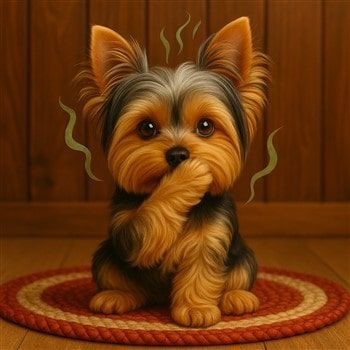Yorkshire Terrier Bad Breath
Overview: Small Dog, Big Smell? Let’s Fix That.
Don’t let their size fool you: Yorkies may be small, but their breath can be shockingly bold. While no dog is expected to have minty-fresh kisses, a strong or persistent odor (medically known as halitosis) is never something to ignore. Bad breath is often your first clue that something’s not quite right, whether it’s as simple as leftover food particles, tartar buildup, or a deeper issue brewing below the surface.
Yorkshire Terriers are especially prone to bad breath. Their tiny jaws mean tightly packed, sometimes overlapping teeth that trap plaque in hard-to-clean spots. They’re also known for sensitive digestion, which can cause sour or foul-smelling breath from issues like acid reflux. Yorkies are also genetically predisposed to liver shunts, which can cause toxin buildup and noticeably bad breath.
The good news is, most cases of bad breath are easy to turn around with the right care. A few simple changes can make a big difference and help your Yorkie smell as sweet as they look. Let’s get started.

Please note: YorkieInfoCenter is reader-supported. Some of the product suggestions on this page are affiliate links. As an Amazon Associate we earn from qualifying purchases. This is at no extra cost to you and helps keep this site running.
Also please note: Already know the causes and are just looking for solutions?
Jump down to:
Remedies to Fix Bad Breath in a Yorkshire Terrier.
The Most Common Causes of Bad Breath in Yorkies
1. Poor Dental Hygiene
Bad breath in Yorkshire Terriers is most often caused by poor dental care. Plaque is a soft film made of bacteria, food particles, and saliva that begins forming within hours after eating and continues to grow if not removed. Over time, it hardens into tartar, which traps more bacteria and produces a strong odor. Yorkies have tightly spaced teeth that make it harder to clean between them, so buildup is more likely. This can lead to gum inflammation (gingivitis), and if left untreated, infection may develop below the gumline (periodontal disease).
2. Food: Debris and Quality
Food left in the mouth is a common cause of bad breath in Yorkies. Dry kibble can crumble into a powder that mixes with saliva to form a paste, which lodges between teeth and begins to smell, especially if the food is stale or is water consumption is low. As trapped particles break down, bacteria release foul-smelling sulfur compounds. In some cases, the diet itself contributes to odor; low-quality foods with meat by-products, cornmeal, or artificial additives are harder to digest and may leave lingering smells in the mouth or gut.
3. Low Water Intake
Saliva helps rinse away food particles and bacteria from your Yorkie’s teeth and gums, keeping the mouth cleaner between brushings. When a dog is dehydrated or not drinking enough, saliva production drops, and the mouth becomes dry. This allows odor-causing bacteria to multiply more easily, leading to noticeably stinky breath.
4. Digestive Upset
Gastrointestinal issues like acid reflux, gas, or nausea can cause bad breath by pushing stomach acids and partially digested food back toward the mouth. These substances have a naturally sour or foul odor and may coat the back of the tongue and throat. Since Yorkies are prone to sensitive digestion, even mild digestive upset can produce noticeable breath changes, often before other symptoms appear.
5. Not Enough Chewing Activity
Chewing naturally stimulates saliva production, which helps clean the teeth and rinse away food particles and bacteria. If a Yorkie doesn’t have access to enough chew toys or dental treats, their mouth may stay drier and there may be less self-cleaning between brushings. This allows more debris and bacteria to build up, leading to stronger breath odor. Regular chewing also helps scrape away soft plaque before it hardens, so a lack of chewing contributes to both odor and dental decline over time.
6. Using Plastic Bowls
Plastic dishes can contribute to bad breath because their surface develops tiny scratches that trap food residue and moisture. This creates the perfect environment for odor-causing microbes to thrive, forming a thin film that clings to the bowl. Each time your Yorkie eats or drinks, their tongue can pick up some of that buildup, bringing the bad smell straight into their mouth. Brightly dyed bowls are the worst offenders, since some dogs react to the pigments with mild mouth irritation, making it easier for germs to take hold.
7. Teething in Puppies
Between 3 and 7 months of age, Yorkie puppies shed their baby teeth while their adult teeth erupt through the gums. This process creates tiny pockets of blood and excess saliva around loose teeth, and the mixture can develop a sour, milk-like odor often called “puppy breath.” Although teething breath is normal and usually fades once all adult teeth are in, gentle daily brushing and safe chew toys help keep odors minimal and support healthy tooth development.
Note: Keep reading to learn about less common causes, or jump down to: Remedies to Fix Bad Breath in a Yorkshire Terrier.
Less Common, Sometimes Serious Causes
Oral Tumors. Mouth tumors can produce a foul, rotting odor due to tissue death (necrosis) or ulceration. Bacteria thrive in these areas, worsening the smell. Other signs may include drooling, swelling, bleeding, or difficulty eating.
Foreign Object Stuck in the Mouth. Small items like twigs, fur, or food debris can become lodged between teeth or in the gums. If not noticed and removed, they may decay or cause localized infection and odor.
Kidney Disease. When the kidneys are not filtering waste properly, toxins build up in the bloodstream. This can cause a strong ammonia-like or urine-scented breath. Other symptoms may include increased thirst, frequent urination, weight loss, and lethargy.
Liver Disease. Liver dysfunction, including portosystemic shunts (which Yorkies are prone to), can lead to a buildup of sulfur-containing compounds like methyl mercaptan and dimethyl sulfide. This causes very strong, unpleasant breath that may smell like rotten eggs, feces, or a musty odor. Signs can include vomiting, poor appetite, small stature, or disorientation after meals.
Diabetes. Uncontrolled diabetes can lead to a sweet, fruity-smelling breath due to ketone buildup. Other signs may include increased hunger, thirst, urination, and unexplained weight loss.
Coprophagia (Eating Feces). Though unpleasant, some dogs (especially puppies) develop a habit of eating feces, either their own or from other animals. This behavior can lead to a sudden onset of extremely foul breath. It may stem from boredom, nutritional deficiencies, or simply learned behavior. If your Yorkie's breath smells unusually bad despite good dental care, and especially if it seems to come and go, it’s worth observing their outdoor habits or checking the yard for signs.
Respiratory Conditions. Infections in the nasal passages, sinuses, or throat can cause mucus and discharge to collect, becoming a breeding ground for bacteria. This can result in very foul-smelling breath, especially if discharge drips down the back of the throat.
Note: Keep reading for signs of bad breath and treatment at home vs calling the vet, or jump down to: Remedies to Fix Bad Breath in a Yorkshire Terrier.
Can You Always See Signs of Bad Breath in Yorkies?
You cannot always see signs of bad breath in Yorkies, even if a problem is present. In some cases, bad breath is the first and only noticeable symptom, even when your Yorkie’s teeth look clean. Odor can stem from trapped food, minor gum irritation, or internal issues like digestive upset, none of which may show up visibly right away.
That said, visible signs often develop over time. Yellow or brown tartar on the teeth, red or swollen gums, and discomfort while eating can all point to more advanced dental problems. But by the time these show up, the underlying issue may have been present for weeks or longer. This makes it important to pay attention to changes in your Yorkie’s breath, even if everything looks normal on the surface.
When to Treat at Home vs. Call the Vet
Not all cases of stinky breath in Yorkshire Terriers is cause for alarm. In many cases, it stems from minor issues like food particles, mild tartar buildup, or low saliva production, all of which can often be resolved with improved at-home care (some up).
However, certain signs suggest that the issue may be more serious and require veterinary attention. Contact your vet if you notice any of the following:
- A sudden change in the smell or intensity of the breath
- Trouble chewing or a decreased interest in food
- Loose, cracked, or missing teeth
- Bleeding or inflamed gums
- Excessive drooling
- Repeated pawing at the mouth or rubbing the face
- Swelling around the jaw or muzzle
- A foul odor that persists despite cleaning the teeth
- Visible pus, sores, or growths in the mouth
When in doubt, it’s always better to have your veterinarian take a look. Dental disease in small breeds like Yorkies can progress quickly and quietly, so early intervention is important.
Remedies to Fix Bad Breath in a Yorkshire Terrier

If your Yorkie’s breath has taken a turn for the worse, don’t worry—there’s plenty you can do to turn things around. While some products give a quick boost of freshness, lasting improvement comes from tackling the root causes. The good news? A few simple habits, paired with the right tools, can make a noticeable difference. Here’s how to keep your Yorkie’s mouth clean and their breath smelling sweet.
1. Brush Your Yorkie’s Teeth
If your Yorkie’s breath tends to turn sour no matter what you try, daily brushing might be the missing piece. This is hands-down the most effective way to keep their mouth clean, fight off bad breath, and protect those tiny teeth for the long run. This breed is known for having dental trouble and often lose teeth early, but with a few minutes of brushing each day, you can help your little one keep more of their teeth into their senior years.
You’ll want to use a toothbrush sized small dogs or a fingertip (slip on) brush, and a toothpaste that’s safe for dogs to swallow. A starter kit like the Tartar Control Kit by Arm and Hammer can be a great way to begin, since it includes everything you need: a tube of effective paste, a two-headed brush (use the small end for your Yorkie), and a fingertip brush so you can try both options to see which type your sweetie tolerates best.
To brush your Yorkie’s teeth, hold them in the crook of your arm with their back resting against your chest. Gently lift the lip from the side and use small circular motions along the gumline. The first few times may feel awkward, and that’s okay. You’re not aiming for perfection. Just focus on being consistent. Even if you only brush a few teeth at a time, it adds up, and over time, it can truly transform your Yorkie’s dental health.
2. Use Dental Wipes
If your Yorkie refuses to tolerate brushing, or if you're finding it hard to stay consistent, dental wipes can be a great alternative. With regular use, they help remove plaque, reduce bacteria, and clear away food residue from the surface of the teeth and along the gums which are two major sources of bad breath.
One option to consider is Nootie Medicated Dental Wipes for Dogs, which goes a step beyond most wipes by including chlorhexidine gluconate. This is a safe, broad-spectrum antiseptic that helps kill oral bacteria, reduce plaque, and prevent gingivitis. It’s especially effective in wipe form because the physical action of wiping helps the ingredient bind to the teeth and gums, giving it a longer-lasting antibacterial effect than simple cleaning alone.
To use them, slip one wipe over the index finger of your dominant hand, and use your other hand to gently lift your Yorkie’s lip. Clean each tooth using a firm but careful twisting motion, making sure to reach the gum line. Daily use is ideal, but even a few times per week can make a noticeable difference if brushing just isn’t an option.
3. Give Dental Chews
Dental chews are specially designed treats that help clean a dog’s teeth as they chew, scraping away soft plaque and stimulating saliva flow to naturally rinse the mouth. This chewing action not only helps freshen breath but also supports overall dental health, especially between brushings.
We recommend Greenie Teenie Dental Chews for Yorkshire Terriers, as they are designed for dogs 5 to 15 lbs. These are made in the USA, vet-recommended, proven to reduce plaque and tartar buildup, and carry the VOHC (Veterinary Oral Health Council) seal of approval. Offer a day, alongside brushing or wipes, and always supervise your Yorkie during chewing so you can throw away any larger bits that may break off. Note that there is also a senior formula for older Yorkies, called Teenie Aging Formula.
4. Dental Rinse (Water Additive)
A dental rinse can be a helpful supplement to brushing, wipes, or chews—especially for Yorkies, who are prone to plaque buildup and gum disease. These rinses are added directly to your dog’s drinking water and work by targeting odor-causing bacteria in the mouth to help cure bad breath and support cleaner teeth. One widely recommended option is Oxyfresh Premium Dental Care Water Additive. It is completely tasteless and odorless, so even picky dogs typically accept it without hesitation.
While its ingredient list may sound technical, each component is considered safe when used as directed. Stabilized chlorine dioxide (Oxygene) gently neutralizes harmful bacteria without harsh chemicals, and zinc acetate supports gum health. Oxyfresh contains no alcohol, xylitol, or artificial flavoring.
5. Address Digestive Issues
If your Yorkie’s bad breath seems to stem from digestive upset such as gas, reflux, or mild nausea, it may help to feed smaller, more frequent meals and avoid rich or hard-to-digest foods. Consider switching to a high-quality, easily digestible diet formulated for sensitive stomachs.
However, if the odor is strong or persistent, or if your dog shows signs like lip licking, gulping, or reluctance to eat, it’s important to consult your veterinarian. Ongoing digestive issues often require medical attention to rule out serious underlying conditions.
6. Supportive Measures
Though these are not cures on their own, these steps can help with bad breath:
- Encourage your Yorkie to drink water after meals to help flush away food particles and bacteria
- Offer small, frequent meals instead of a few large ones to support better digestion
- Store food in an airtight container to keep it fresh and prevent spoilage
- Don’t let kibble sit out too long, as stale food can contribute to bad breath and digestive upset
- Use stainless steel bowls instead of plastic
- Wash food and water bowls daily
- Provide safe chew toys, which help reduce plaque and stimulate saliva flow
Final Thoughts
More Articles for You:
The Best Treats for Yorkies with Sensitive Stomachs - If your Yorkshire Terrier has a tummy that’s quick to rumble, finding the right treat can feel like a guessing game. Thankfully, there are some gentle goodies that deliver fantastic, lip-smacking flavor.
5 Yorkie Care Products That Work in 5 Minutes or Less - Short on time but still want your Yorkie looking fresh and fabulous? These quick-care essentials tackle big needs in just minutes; no full spa day required. See these speedy solutions help your little one stay clean, comfy, and camera-ready anytime.
You May Also Like:
Do You Have Your Book?
The YorkieInfoCenter Book is now available in both print format and a PDF eBook. It's a great resource that takes you through every stage of your Yorkie's life.
